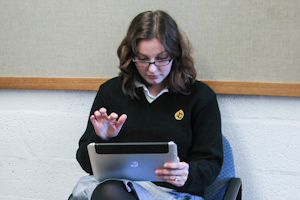Currently testing new tablets, the technology department is looking to the future.
Although, according to Director of Technology Greg Russell, iPads and Android tablets have been and continue to be considered, they will not be a part of JC until they are fully capable of performing the necessary functions that the current tablet computers do.
According to Technology Specialist Chuck Wilson, the computer program offered sets JC apart from most high schools who continue to use the traditional pen and paper learning system. “[There are] things our students can do [with computers] that you just can’t do without them,” Wilson said.
According to Wilson, the downside of not having a personal laptop in school is that students have to wait until they can access to a computer to do school work. With personal laptops “[students have] instant access to [their] school work,” Wilson said.
According to Russell, the tech department “evaluates” new technology every spring. “We’ve tried to evaluate all the possible devices to get the best educational device for students,” Russell said.
A few things that prevent JC from becoming a tablet-based school are its inability to effectively offer a physical keyboard and stylus option, its limited amount of space, and its lack of proper coverage in case of damage, according to Russell.
Russell tested the ThinkPad Ultrabook, the HP Elite, and the ThinkPad 2 Tablet 2. “They’re promising but I don’t think they are quite up to the current standard of the current PC,” Russell said. Wilson is currently testing the Microsoft Surface RT, a tablet that runs Windows 8.
“It works really well. It’s easy to get used to using,” Wilson said. Wilson also claims it has an ability to install anything a normal windows computer can install. Microsoft Surface could be seen in the future for students, according to Wilson. The technology department plans on viewing tablets by other manufacturers as well, like Apple and HP.
Technology Lab Help Desk Coordinator Joseph Vitucci agreed that tablets have been “considered,” but “lack functionality.” Not only do they not function as a laptop would, but the overall cost for a tablet is more expensive than the laptops currently used.
Depending on the laptop chosen, the price “drops 10 to 12 percent each year,” Vitucci said. The Microsoft Surface costs roughly $600 to $1,000 depending on the amount of gigabytes it contains. According to Wilson, it’s “cheaper than a laptop,” but would cost more to maintain.
Russell believes that in the future, computers will change just as technology continues to change every day, and JC will have to adapt to that change. “[We may] end up going to a windows based tablet,” he said.
Brianna George is a Photographer/Copy Editor for The Patriot and jcpatriot.com.



